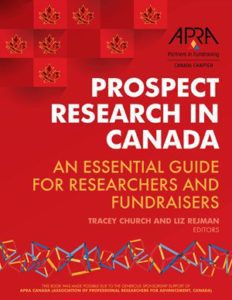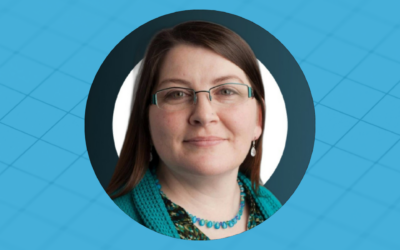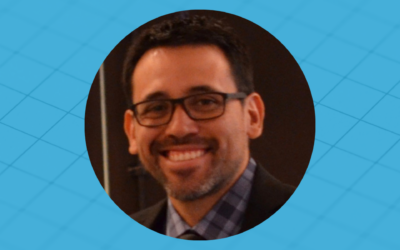by Liz Rejman
Tracey Church and I share many things: a love of red wine, pride in serving Apra, and little fear in taking risks. We also have taught prospect research courses in Canadian post-secondary institutions using Cecilia Hogan’s book as the text.
and I share many things: a love of red wine, pride in serving Apra, and little fear in taking risks. We also have taught prospect research courses in Canadian post-secondary institutions using Cecilia Hogan’s book as the text.
The key thing that Tracey and I also shared which ultimately led to the creation of Prospect Research in Canada was a hotel room in Chicago in February 2015. It was there, attending an Apra Chapters Summit and drinking red wine that the feasibility of such a work was discussed.
We knew there was a need.
We knew of a company who specialized in publishing Canadian fundraising books.
We knew that it would cost money and that the Apra Canada chapter would be open to funding such endeavour.
We knew quite a number of smart Canadian prospect development folks in the field who could contribute their insights on specific topics.
We also knew if anyone was going to launch such a project off the ground, it was going to be us. We are two people who aren’t afraid of some hard work (little did we know how much work would be involved).
A plan and timeline was hatched. There would be an editorial committee and multiple contributors. We would launch the book at the Apra Canada conference in October 2016 which also coincided with the 15 year anniversary of the chapter.
The end result: a tome that was double the size of any book that our publishers had worked on with 30 people contributing content. Oh, and the first Canadian focused book on the topic of prospect research.
Being the first of its kind, we learned a lot along the way. Here are the top three things that we would advise any other chapter to consider before embarking on a similar project:
1. Decide the number of contributors in advance
We lucked out. The 30 contributors we had adhered to the deadlines and wrote coherently with a similar voice. But given that each contributor needed to provide a biography, their chapter content, a brief introduction beyond the chapter and a list of index words – it resulted in 120 initial documents – add on that multiple versions of each chapter and the number of documents multiply. File management plays a significant role in book writing. And as noted, we were lucky – everyone respected the deadlines and wrote well. But if we were to do it all again, I suspect we would max out the number of contributors to five.
2. Give yourself time to change the content
We don’t regret in any way the topics, contributors or content we choose to write about. And when it all came together, it fit well in terms of content, tone and information. The challenge with the timeline was that we didn’t give ourselves the space to take a step back during the process and evaluate if what we initially thought was relevant was still the case.
3. Editing takes longer than anticipated
Editing took longer than we thought. There is a lot of reading, red ink, and double checking. You hit a bit of a wall 75% into the editing process (around the end of the second set of editing). It was at that point that the publisher’s editor really helped us to keep things moving forward with words of encouragement, some wiggle room in the timeline, and a relentless eye on the end goal.
Would we do it again? I think Tracey is ready with pen in hand, poised to develop a new timeline and new content. Me? I think I’ll focus on my Apra Presidency for the short term!


